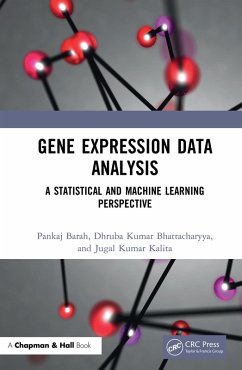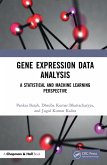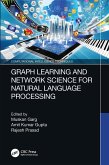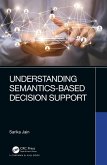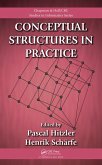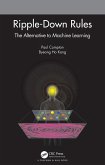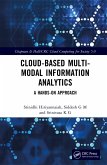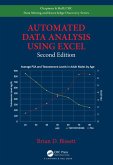Pankaj Barah, Dhruba Kumar Bhattacharyya, Jugal Kumar Kalita
Gene Expression Data Analysis (eBook, PDF)
A Statistical and Machine Learning Perspective
62,95 €
62,95 €
inkl. MwSt.
Sofort per Download lieferbar

31 °P sammeln
62,95 €
Als Download kaufen

62,95 €
inkl. MwSt.
Sofort per Download lieferbar

31 °P sammeln
Jetzt verschenken
Alle Infos zum eBook verschenken
62,95 €
inkl. MwSt.
Sofort per Download lieferbar
Alle Infos zum eBook verschenken

31 °P sammeln
Pankaj Barah, Dhruba Kumar Bhattacharyya, Jugal Kumar Kalita
Gene Expression Data Analysis (eBook, PDF)
A Statistical and Machine Learning Perspective
- Format: PDF
- Merkliste
- Auf die Merkliste
- Bewerten Bewerten
- Teilen
- Produkt teilen
- Produkterinnerung
- Produkterinnerung

Bitte loggen Sie sich zunächst in Ihr Kundenkonto ein oder registrieren Sie sich bei
bücher.de, um das eBook-Abo tolino select nutzen zu können.
Hier können Sie sich einloggen
Hier können Sie sich einloggen
Sie sind bereits eingeloggt. Klicken Sie auf 2. tolino select Abo, um fortzufahren.

Bitte loggen Sie sich zunächst in Ihr Kundenkonto ein oder registrieren Sie sich bei bücher.de, um das eBook-Abo tolino select nutzen zu können.
The book introduces phenomenal growth of data generated by increasing numbers of genome sequencing projects and other throughput technology-led experimental efforts. It provides information about various sources of gene expression data, and pre-processing, analysis, and validation of such data.
- Geräte: PC
- ohne Kopierschutz
- eBook Hilfe
- Größe: 8.5MB
Andere Kunden interessierten sich auch für
![Gene Expression Data Analysis (eBook, ePUB) Gene Expression Data Analysis (eBook, ePUB)]() Pankaj BarahGene Expression Data Analysis (eBook, ePUB)62,95 €
Pankaj BarahGene Expression Data Analysis (eBook, ePUB)62,95 €![Graph Learning and Network Science for Natural Language Processing (eBook, PDF) Graph Learning and Network Science for Natural Language Processing (eBook, PDF)]() Graph Learning and Network Science for Natural Language Processing (eBook, PDF)48,95 €
Graph Learning and Network Science for Natural Language Processing (eBook, PDF)48,95 €![Understanding Semantics-Based Decision Support (eBook, PDF) Understanding Semantics-Based Decision Support (eBook, PDF)]() Sarika JainUnderstanding Semantics-Based Decision Support (eBook, PDF)44,95 €
Sarika JainUnderstanding Semantics-Based Decision Support (eBook, PDF)44,95 €![Conceptual Structures in Practice (eBook, PDF) Conceptual Structures in Practice (eBook, PDF)]() Conceptual Structures in Practice (eBook, PDF)75,95 €
Conceptual Structures in Practice (eBook, PDF)75,95 €![Ripple-Down Rules (eBook, PDF) Ripple-Down Rules (eBook, PDF)]() Paul ComptonRipple-Down Rules (eBook, PDF)55,95 €
Paul ComptonRipple-Down Rules (eBook, PDF)55,95 €![Cloud-based Multi-Modal Information Analytics (eBook, PDF) Cloud-based Multi-Modal Information Analytics (eBook, PDF)]() Srinidhi HiriyannaiahCloud-based Multi-Modal Information Analytics (eBook, PDF)47,95 €
Srinidhi HiriyannaiahCloud-based Multi-Modal Information Analytics (eBook, PDF)47,95 €![Automated Data Analysis Using Excel (eBook, PDF) Automated Data Analysis Using Excel (eBook, PDF)]() Brian D. BissettAutomated Data Analysis Using Excel (eBook, PDF)70,95 €
Brian D. BissettAutomated Data Analysis Using Excel (eBook, PDF)70,95 €-
-
-
The book introduces phenomenal growth of data generated by increasing numbers of genome sequencing projects and other throughput technology-led experimental efforts. It provides information about various sources of gene expression data, and pre-processing, analysis, and validation of such data.
Dieser Download kann aus rechtlichen Gründen nur mit Rechnungsadresse in A, B, BG, CY, CZ, D, DK, EW, E, FIN, F, GR, HR, H, IRL, I, LT, L, LR, M, NL, PL, P, R, S, SLO, SK ausgeliefert werden.
Produktdetails
- Produktdetails
- Verlag: Taylor & Francis eBooks
- Seitenzahl: 378
- Erscheinungstermin: 21. November 2021
- Englisch
- ISBN-13: 9781000425734
- Artikelnr.: 62802409
- Verlag: Taylor & Francis eBooks
- Seitenzahl: 378
- Erscheinungstermin: 21. November 2021
- Englisch
- ISBN-13: 9781000425734
- Artikelnr.: 62802409
- Herstellerkennzeichnung Die Herstellerinformationen sind derzeit nicht verfügbar.
Pankaj Barah is an Assistant professor in Molecular Biology and Biotechnology at Tezpur University. He has received his M.Sc. degree in Bioinformatics (2006) from University of Madras in India and PhD in Computational Systems Biology (2013) from the Norwegian University of Science and Technology (NTNU), Trondheim, Norway. He has worked as Bioinformatics scientist in the division of Theoretical Bioinformatics at German Cancer Research Center (DKFZ) in Heidelberg, Germany during 2015-2017. His research areas include- computational systems biology, bioinformatics, evolutionary systems biology, Next Generation Sequencing (NGS), Big data analytics and biological networks. He has authored 20 research articles, edited two books and written 5 book chapters. He is recipient of Ramalingaswami Re-entry Fellowship from the Department of Biotechnology, Government of India. Dr. Barah is currently a member of the Indian National Young Academy of Sciences.
Dhruba Kumar Bhattacharyya is a professor in Computer Science and Engineering at Tezpur University. He teaches machine learning, network security, cryptography and computational biology in UG, PG and PhD classes at Tezpur University. Professor Bhattacharyya's research areas include machine learning, network security, and bioinformatics. He has published more than 280 research articles in leading international journals and peer-reviewed conference proceedings. Dr. Bhattacharyya has authored 5 technical reference books and edited 9 technical volumes. Under his guidance, twenty students have successfully completed Ph.D. in the areas of machine learning, bioinformatics and network security. He is PI of several major research grants, including the Centre of Excellence of Ministry of HRD of Government of India under FAST instituted at Tezpur University. Professor Bhattacharyya is a Fellow of IETE and IE, India. He is also a Senior Member of IEEE. More details about Dr Bhattacharyya can be found at http://agnigarh.tezu.ernet.in/_dkb/index.html.
Jugal Kumar Kalita teaches computer science at the University of Colorado, Colorado Springs. He received M.S. and Ph.D. degrees in computer and information science from the University of Pennsylvania in Philadelphia in 1988 and 1990, respectively. Prior to that he had received an M.Sc. from the University of Saskatchewan in Saskatoon, Canada in 1984 and a B.Tech. from the Indian Institute of Technology, Kharagpur in 1982. His expertise is in the areas of artificial intelligence and machine learning, and the application of techniques in machine learning to network security, natural language processing and bioinformatics. He has published 130 papers in journals and refereed conferences. He is the author of a book on Perl titled "On Perl: Perl for Students and Professionals". He is also a coauthor of a book titled "Network Anomaly Detection: A Machine Learning Perspective" with Dr Dhruba K Bhattacharyya. He received the Chancellor's Award at the University of Colorado, Colorado Springs, in 2011, in recognition of lifelong excellence in teaching, research and service. More details about Dr. Kalita can be found at http://www.cs.uccs.edu/_kalita.
Dhruba Kumar Bhattacharyya is a professor in Computer Science and Engineering at Tezpur University. He teaches machine learning, network security, cryptography and computational biology in UG, PG and PhD classes at Tezpur University. Professor Bhattacharyya's research areas include machine learning, network security, and bioinformatics. He has published more than 280 research articles in leading international journals and peer-reviewed conference proceedings. Dr. Bhattacharyya has authored 5 technical reference books and edited 9 technical volumes. Under his guidance, twenty students have successfully completed Ph.D. in the areas of machine learning, bioinformatics and network security. He is PI of several major research grants, including the Centre of Excellence of Ministry of HRD of Government of India under FAST instituted at Tezpur University. Professor Bhattacharyya is a Fellow of IETE and IE, India. He is also a Senior Member of IEEE. More details about Dr Bhattacharyya can be found at http://agnigarh.tezu.ernet.in/_dkb/index.html.
Jugal Kumar Kalita teaches computer science at the University of Colorado, Colorado Springs. He received M.S. and Ph.D. degrees in computer and information science from the University of Pennsylvania in Philadelphia in 1988 and 1990, respectively. Prior to that he had received an M.Sc. from the University of Saskatchewan in Saskatoon, Canada in 1984 and a B.Tech. from the Indian Institute of Technology, Kharagpur in 1982. His expertise is in the areas of artificial intelligence and machine learning, and the application of techniques in machine learning to network security, natural language processing and bioinformatics. He has published 130 papers in journals and refereed conferences. He is the author of a book on Perl titled "On Perl: Perl for Students and Professionals". He is also a coauthor of a book titled "Network Anomaly Detection: A Machine Learning Perspective" with Dr Dhruba K Bhattacharyya. He received the Chancellor's Award at the University of Colorado, Colorado Springs, in 2011, in recognition of lifelong excellence in teaching, research and service. More details about Dr. Kalita can be found at http://www.cs.uccs.edu/_kalita.
Preface. Acknowledgements. Abstract. Authors. Introduction. Information
Flow in Biological Systems. Gene Expression Data Generation. Statistical
Foundations and Machine Learning. Co-expression Analysis. Differential
Expression Analysis. Tools and Systems. Concluding Remarks and Research
Challenges. Index. Glossary.
Flow in Biological Systems. Gene Expression Data Generation. Statistical
Foundations and Machine Learning. Co-expression Analysis. Differential
Expression Analysis. Tools and Systems. Concluding Remarks and Research
Challenges. Index. Glossary.
Preface. Acknowledgements. Abstract. Authors. Introduction. Information
Flow in Biological Systems. Gene Expression Data Generation. Statistical
Foundations and Machine Learning. Co-expression Analysis. Differential
Expression Analysis. Tools and Systems. Concluding Remarks and Research
Challenges. Index. Glossary.
Flow in Biological Systems. Gene Expression Data Generation. Statistical
Foundations and Machine Learning. Co-expression Analysis. Differential
Expression Analysis. Tools and Systems. Concluding Remarks and Research
Challenges. Index. Glossary.
